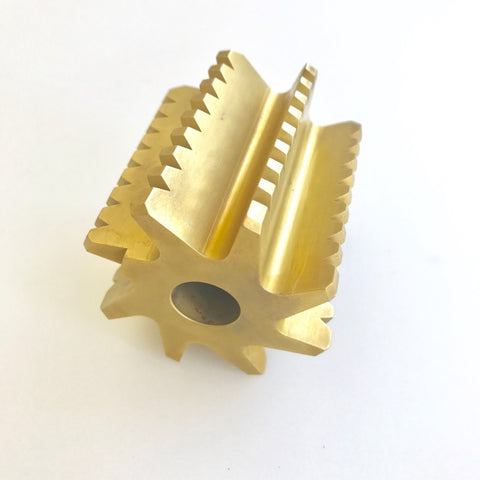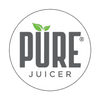Both cutters are made from food-safe stainless steel. Having designed, developed and tested both cutters the main difference is the frequency of sharpening. Beyond this, the results are similar with the following differences.

The Serrated Cutter is made from heat-treated and hardened 440c stainless steel. It has a very uniform push-pressure, has almost no kickback and almost never needs sharpening. With heavy use, the first sharpening will be around 2-5 years, and with normal use 5-10 years or longer between sharpening. Proper care of 440c is to hand wash and wipe dry, do not clean in the dishwasher.

The Straight Cutter is made from 304 stainless steel. This type of steel cannot be hardened but it is incredibly corrosion-resistant and is dishwasher safe. The straight cutter has some variability in push pressure, sometimes more and sometimes considerably less. You will see with carrots some bits of produce pop up occasionally.
Each cutter has pluses and minus’, PURE's goal was to offer a less expensive cutter with the straight cutter and make the PURE juicer more affordable.
The grind is very similar, the straight cutter works slightly better on really fibrous produce like celery or ginger because the long stringy fibers are shredded more completely with the straight cutter. The serrated cutter is more uniform and consistent in push feel. Both cutters triturate (grind) very well. If the produce was cool before grinding, it will remain cool with either cutter.
You can’t go wrong, both are great cutters!
So regardless of the cutter you choose, we are confident your juicing experience will produce the highest yield of the best and healthiest juice possible for wherever your juicing journey takes you.
More on Cutters - Testing,

Testing shows the interrupted edge on the serrated cutter produces a more uniform feel (push-pressure) with less kickback. The straight cutter often cuts more aggressively but also has more potential kickback.
Testing, testing, testing, PURE is always looking to move the state-of-the-art forward, we have tested different: alloys, cutter tooth profiles, Number of teeth, serrations, and coatings.

and more testing.

The above is a TIN coated cutter. We are always looking for an edge!
A note on kickback prevention, the PURE Juicer has almost no kickback but we do get a little in certain circumstances. Most kickback occurs with carrots, typically on the first push, sometimes with greens if just a few leaves are loosely added into the feed tube.
To prevent kickback:
1. In general, the smaller the grid the less kickback. Use the smallest grid that is practical, typically this will be an #8 or a #10. The #12 is for celery, ginger and really fibrous produce.
2. Best practice, When pushing if there is kickback, do not push all the way to the bottom. Stop 1/2" from the bottom of the pusher. This will form a plug and block kickback. Keep pushing like this until the last push, then push to the bottom of the pusher.
3. Carrots, cover the top of the feed tube, palm dawn and insert the carrot in the opening between thumb and forefinger.
4. Greens, fold greens in half, stems to leaves. Use a large enough bunch to fully fill the feed tube. This will prevent any kickback.
All of us at PURE, are deeply committed to improving the health and wellness of everyone - one PURE juicer at a time.
If you have further questions, please write support@purejuicers.com and we will answer there or add to this article.
La Chaim (to life),
David
Founder | CEO



Leave a comment